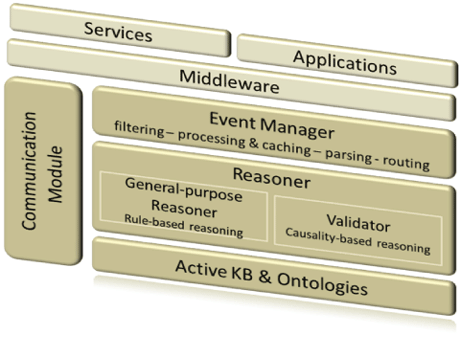by Theodore Patkos and Dimitris Plexousakis
The intriguing objective of AI - to create intelligent autonomous agents that exhibit commonsense behavior in the real world - forces research to go beyond many deep-rooted simplistic assumptions and to acknowledge the restrictions and complexity of our surroundings. The nascent field of Ambient Intelligence (AmI), that formulates current trends and challenges in Europe, opens new avenues of research for AI. Intelligent and usable computing devices need to prove their cognitive skills in environments that involve dynamically changing context, where information quickly becomes obsolete as a result of context-dependent occurrences or actions performed by users. Reasoning under partial knowledge is intended to promote run-time decision-making based on knowledge about the effects of events and their ramifications and on causal relationships among different components of the world, even when information about the components is incomplete.
A unifying formal framework providing the substrate on which to devise techniques addressing the aforementioned issues is currently missing. To this end, we have developed DECKT (Discrete Event Calculus Knowledge Theory), a formal framework for automated epistemic, temporal and causal reasoning for dynamic, uncertain and partially known domains. The theory enables the integration of cognitive capabilities to the mental state of reasoning agents by coupling the temporal aspect of knowledge with the causal description of a domain and the actions performed by entities that operate and change it. A multitude of commonsense phenomena can be represented: they range from knowledge about direct effects and complex ramifications of context-dependent actions or physically triggered events, to knowledge-producing actions and loss of knowledge, continuous change, temporary knowledge and delayed knowledge effects.
DECKT adopts a representation for knowledge that does not employ the commonly used possible worlds semantics, which dominate the formal characterization of various manifestations of epistemic concepts. A major impediment is the computationally intensive reasoning required under this semantics which, in effect, is making the task of producing performant practical implementations very difficult. Instead, our theory’s efficiency stems from establishing a sound and complete translation of possible worlds into a generic form of implication rules, called hidden causal dependencies, that are treated as ordinary epistemic concepts and are more conveniently axiomatized.
The approach builds on contemporary progress in the field of cognitive robotics; even so, its application is being tested on different scenarios of commonsense reasoning for AmI. DECKT forms part of a reasoning framework that is being employed in a large-scale AmI-related project conducted at FORTH-ICS. The goal of this project is to provide efficient representation, monitoring and dissemination of any low- or high-level contextual information, as well as to support a number of general-purpose and domain-specific inference tasks for smart devises. The framework couples methodologies from the Semantic Web and the Action Theories domains and deploys the hybrid event-based reasoning architecture shown in Figure 1. Causality-based reasoning and DECKT contribute in verifying that the specifications of the applications that are implemented by different research groups in the project are in compliance with the overall system restrictions, as specified by services, thus detecting errors early at the development phase. In addition to this task that is accomplished in isolation at design-time, action validation, performed at run-time, considers the potentially partially known current state of the system, as well as the conflicts that might arise with other applications that share the same resources.

Figure 1: Event management framework architecture.
Furthermore, DECKT is also used to provide reasoning capabilities to mobile and resource-constrained devices that inhabit smart spaces. PDAs, smart phones and other autonomous devices, capable of executing commonsense tasks, constitute the core of the AmI vision, as these devices play a lead role in the realization of domains such as ambient assisted living for the support of individuals with cognitive or physical impairments. For user assistive applications and personal agents hosted on these devices, reasoning under partial knowledge is an essential prerequisite, as such devices experience substantial restrictions not only in storing relevant contextual information, but also in accessing it. DECKT-enabled agents can promote the execution of different types of tasks:
- they can be instructed to proactively or reactively devise ways to accomplish user objectives that comply with the user’s needs, given the specifications of the smart space (planning)
- they may assist users while performing certain tasks and explain the behaviour of the system in response to their actions (postdiction and model finding)
- they can foresee the result of actions by predicting the user’s intentions and provide relevant assistance, eg suggestions or warnings (projection).
The agents can take advantage of the facilities of the smart space, i.e., sensors, services and devices, based on certain privacy policies. Nevertheless we should expect that their knowledge about the environment for executing reasoning is neither complete nor constantly updated.
Conclusions
As the emphasis is now placed on supporting humans with problems of everyday life while lessening their cognitive load on dealing with technology, intelligent computing systems need to become more cognitive and usable. DECKT, as a tool for automated epistemic reasoning for a wide range of phenomena, aims to help agents to understand their environment, whilst taking into account their own capabilities and limitations, in order to achieve more accurate commonsense inference.
Links:
FORTH-ICS AmI programme: http://www.ics.forth.gr/ami/index.html
DECKT implementation: http://www.csd.uoc.gr/~patkos/deckt.htm
Please contact:
Dimitris Plexousakis
FORTH-ICS, Greece
Tel:+30 2810 391637
E-mail:










